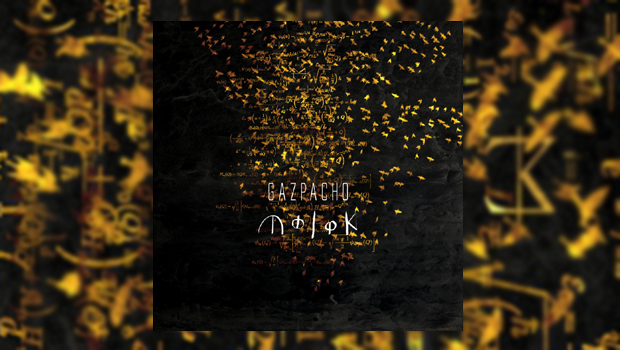When you are offered turkey, it is often asked would you like light or dark meat. I like a little dark meat.
Gazpacho are a Norwegian band who I had previously heard of but never listened to. More fool me; this album is NOT a turkey. It is dark – but given the themes that is not surprising – sometimes sounding a little industrial. At other times a blend of electric and acoustic instruments gives an almost folky feel.
The theme of the album is the complicated relationship between religion, man and machine, but if you want a more in depth breakdown of the themes go to the Kscope website.
Molok (or Moloch? Multiple spellings are available) is a pre-Christian idol or deity, mentioned in Leviticus 18:21:-
“And thou shalt not let any of thy seed pass through the fire to Moloch”
So chuckles may, in fact, be in short supply.
Opening with Park Bench, it is both tribal and industrial before opening out into a soundscape that is mechanical and somehow religious, the strangeness of it all is almost Kate Bush-like. Yes, names will appear, and comparison will be made, but this is nothing other than original. When you really let it fly through serious speakers the textures are truly revealed. Any chance of a 5.1 mix?
The Master’s Voice starts to tinkle, Harry Potter-like, before a key change that reminds me of Forbidden Colours / Bamboo Music by David Sylvian and Ryuichi Sakamoto, the controlled rhythm section painting pictures. I will probably take this as it is, track by track, as it seems the best way for the story being told.
Bela Kiss is anthemic, barring the use of violins. I find it a very Muse-like track, the ‘pickled onions’ line made me grin from ear to ear. Muse it is, but still original and possibly my eccentric favourite.
This album is all about light and shadow to me. Where you determine the shadow to fall is a personal decision as it is a very complicated theme. Know Your Time, given prog’s reputation, is quite a commercial piece, but in a nice way with some good use of power chords in the middle bridge before sliding into a Celtic ending. And onwards with Choir of Ancestors, for a band I have never listened to they do sound very familiar. I think it’s the phrasing, and once the review is put to bed it will click into place. Certain Daniel Lanois tracks feel like this, it is a spiritual thing.
ABC; were it so simple. That mixture of manufactured and natural remains consistent. It’s piano time again, no more pickled onions but instead the discoverer of Uranus, William Herschel, crops up, along with the ancient site of Newgrange and the Solstice, again marking the passage of time. There is some really tight drumming on this piece. Algorithm feels both spiritual and Eastern European, an unusual choice but it draws things together. It appears quite alien, undulating as the music rises and falls before rising again. Alarm is desolate, dark falls again with light counter points. A warning maybe? I still get those Sylvian twists and maybe a touch of Porcupine Tree.
Then finally Molok Rising, the domination of science over religion, the breaking down of all things. A sombre piece of music to thine ears, the female voice here lifting things. As the last track ends a blip, a coded message:-
“A small code that sounds like a strange noise at the end of the album will cause the correction software that runs in all CD players to generate a random number every time the CD is played. If that number should correspond to the actual position of all electrons in the universe then technically the universe could be destroyed.”
I’ve heard it, many times now. You’re reading the review. We’re still here.
Dr Adam Washington from the University of Sheffield confirms that this is science fact rather than fiction:-
“The random signal produced by the end of the disk contains enough bits of information to express a measurement of the total number of fundamental particles present in the universe. If the noise actually contained such a measurement, and that measurement was performed rapidly enough, the universe’s total particle count could be fixed under the Quantum Zeno effect. Locking the total particle count would prevent the pair production that forms a fundamental part of the decay of black holes. Without such decay forces, black holes would remain stable forever, without the need for nearby matter or the cosmic microwave background to keep them fed. This would greatly hasten the practical end of the universe.”
Listen with care.
Gazpacho have produced something that has grown in the listening. Some say they have produced better, but as a newbie I have found something outside my comfort zone that I will want to explore further. I commend this to you, and should you get to the end and the numbers match, it won’t matter anyway.
[We also have a review of Gazpacho live in London, which you can read HERE, and an interview with Gazpacho keyboardist Thomas Andersen, which you can read HERE.]
TRACK LISTING
01. Park Bench (6:59)
02. The Master’s Voice (4:11)
03. Bela Kiss (2:45)
04. Know Your Time (6:11)
05. Choir Of Ancestors (4:59)
06. ABC (3:32)
07. Algorithm (3:17)
08. Alarm (3:59)
09. Molok Rising (9:38)
Total Time – 45:31
MUSICIANS
Jan Henrik Ohme – Vocals
Jon-Arne Vilbo – Guitars
Thomas Andersen – Keyboards, Programming
Lars Erik Asp – Drums
Kristian Torp – Bass
Mikael Krømer – Violin, Mandolin
ADDITIONAL INFO
Record Label: Kscope Music
Country of Origin: Norway
Year of Release: 2015

